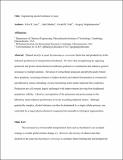Engineering alcohol tolerance in yeast
Author(s)
Lam, Felix H.; Ghaderi, Adel; Stephanopoulos, Gregory; Fink, Gerald R
DownloadStephanopoulos_Engineering alcohol.pdf (3.502Mb)
PUBLISHER_POLICY
Publisher Policy
Article is made available in accordance with the publisher's policy and may be subject to US copyright law. Please refer to the publisher's site for terms of use.
Terms of use
Metadata
Show full item recordAbstract
Ethanol toxicity in the yeast Saccharomyces cerevisiae limits titer and productivity in the industrial production of transportation bioethanol. We show that strengthening the opposing potassium and proton electrochemical membrane gradients is a mechanism that enhances general resistance to multiple alcohols. The elevation of extracellular potassium and pH physically bolsters these gradients, increasing tolerance to higher alcohols and ethanol fermentation in commercial and laboratory strains (including a xylose-fermenting strain) under industrial-like conditions. Production per cell remains largely unchanged, with improvements deriving from heightened population viability. Likewise, up-regulation of the potassium and proton pumps in the laboratory strain enhances performance to levels exceeding those of industrial strains. Although genetically complex, alcohol tolerance can thus be dominated by a single cellular process, one controlled by a major physicochemical component but amenable to biological augmentation.
Date issued
2014-10Department
Massachusetts Institute of Technology. Department of Biology; Massachusetts Institute of Technology. Department of Chemical Engineering; Whitehead Institute for Biomedical ResearchJournal
Science
Publisher
American Association for the Advancement of Science (AAAS)
Citation
Lam, F. H., A. Ghaderi, G. R. Fink, and G. Stephanopoulos. “Engineering Alcohol Tolerance in Yeast.” Science 346, no. 6205 (October 2, 2014): 71–75.
Version: Author's final manuscript
ISSN
0036-8075
1095-9203